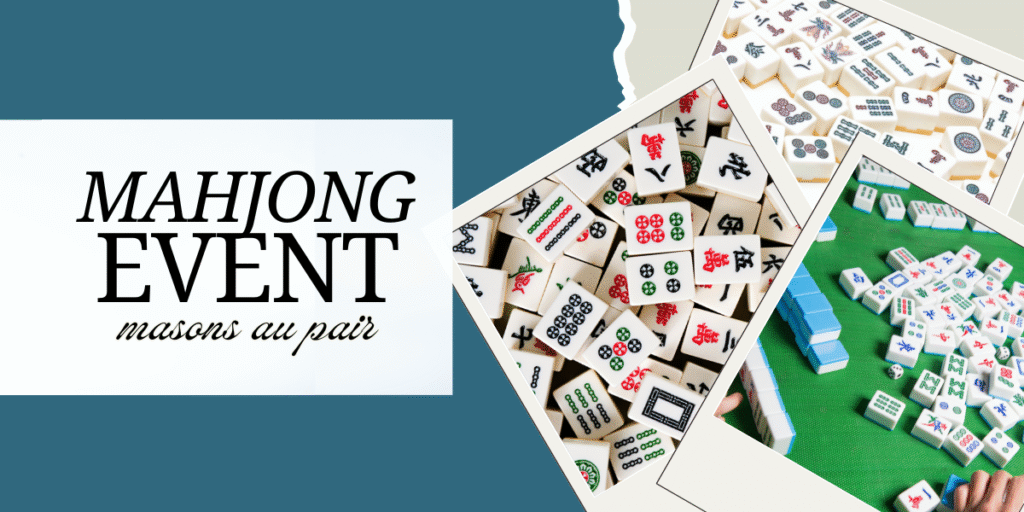Masons Au Pair hosted a hands-on Mahjong cultural exchange event in Chengdu, designed for au pairs, international students, and cultural travelers. Participants learned Sichuan Mahjong rules, practiced Mandarin in real conversations, and explored Chinese traditions in a welcoming community setting. This article covers Mahjong basics, table etiquette, strategy tips, vocabulary, and an SEO-friendly FAQ to help you join our next event.
What Is Mahjong? Origins, Tiles, and Why It Matters in China
Mahjong (麻将) is a tile-based strategy game with 144 tiles—Characters (万), Bamboo (条), Dots (筒), Winds (东南西北), and Dragons (中发白). Emerging in late imperial China and popular during the Qing dynasty, Mahjong remains central to Chinese social life—from family gatherings and holidays to local tea houses.
For au pairs and students, Mahjong is a practical bridge to Chinese culture, language, etiquette, numeracy, memory, and focus. It’s also a great way to connect with host families and locals in Chengdu.
Core Concepts & Table Etiquette
- Suits: Characters, Bamboo, Dots
- Honors: Winds & Dragons
- Common calls: Péng (碰), Chī (吃), Gàng (杠), Hú (胡)
- Etiquette: play clockwise, announce calls clearly, keep discards neat
Our Chengdu Mahjong Event: Learn, Play, and Practice Mandarin
Our event used a learn-by-playing format. Participants built the wall, drew and discarded tiles, and practiced real table phrases. Local mentors and host families explained Sichuan Mahjong specifics, scoring basics, and friendly strategies.
- ✅ Beginner-friendly lessons: set-up, turn order, reading tiles, winning hands
- 🗣️ Mandarin in action: numbers, directions, polite phrases, Mahjong vocabulary
- 🤝 Community bonding: au pairs + students + host families
- 🎯 Regional variation: pace and scoring quirks of Sichuan style
Why Mahjong Is Perfect for Cultural Exchange
Mahjong in Chengdu is more than a game—it’s living heritage. Playing together helps au pairs and international students:
- Improve Mandarin through real conversations at the table
- Understand Chinese traditions, family rituals, and social etiquette
- Build friendships with host families and peers
- Gain confidence navigating daily life in Sichuan
Sichuan Mahjong Rules for Beginners (Fast Guide)
- Set up the wall: shuffle tiles face-down; build a square wall.
- Draw & discard: each player starts with 13 (dealer 14); draw one, discard one.
- Form melds: pungs (three of a kind), chows (sequences), kongs (four of a kind) + 1 pair.
- Calls: announce Péng/Chī/Gàng when allowed; place melds openly.
- Win (Hú): complete a legal hand; declare “Hú!”
- Etiquette: keep discards tidy; be clear, patient, and respectful.
Note: Sichuan Mahjong can feature faster play and distinct scoring—our mentors teach a beginner-friendly variant so everyone can participate.
Useful Mandarin Phrases for Mahjong Tables
- Numbers 1–9: yī (1), èr (2), sān (3), sì (4), wǔ (5), liù (6), qī (7), bā (8), jiǔ (9)
- Calls: Péng (I take three of a kind), Chī (sequence), Gàng (kong), Hú (win)
- Politeness: qǐng (please), xièxie (thanks), méiguānxi (no worries)
- Etiquette: màn yì diǎn (a bit slower), kěyǐ ma? (is it okay?)
Practical Tips: Learn Faster and Enjoy More
Recognize Characters/Bamboo/Dots quickly to speed up decisions.
Practice one mechanic (e.g., only Péng) before mixing all calls.
Announce clearly, keep the wall neat, and respect the table’s pace.
Great bonding + natural Mandarin; many Chengdu families love Mahjong.
Event Highlights from Chengdu
- First wins and big smiles calling “Hú!”
- Local strategy tips and stories about festival play
- Strong community vibe—exactly what cultural exchange is about
Join Our Next Cultural Event in China
Ready to experience authentic Chinese culture while living with a welcoming host family in Chengdu? Explore our programs: Au Pair in China, Mandarin classes, and cultural events.
Mahjong in Chengdu – FAQ (SEO)
Is Mahjong hard to learn for beginners?
No. With a quick intro to tiles and basic calls (Péng, Chī, Gàng), most beginners play confidently in one session.
What is Sichuan Mahjong and how is it different?
Sichuan Mahjong is a fast, popular regional variant in Chengdu. It keeps core mechanics (melds, Hú) but may adjust scoring and pace. Our events use a beginner-friendly style.
Do I need to speak Mandarin to join a Mahjong event?
Not required. We teach useful Mahjong vocabulary and simple Mandarin phrases so you can learn while playing.
Is Mahjong good for cultural exchange and host family bonding?
Absolutely. Mahjong is part of Chinese traditions and family life. Playing with your host family builds language skills and trust.
What should I bring to the event?
Curiosity, a notebook for numbers/phrases, and comfortable clothing. Optional: a tile cheat-sheet to speed up learning.
How do I join the next Masons Au Pair event in Chengdu?
Visit our events page or the Au Pair in China program page. Au pairs in Chengdu get priority for cultural exchange activities.

